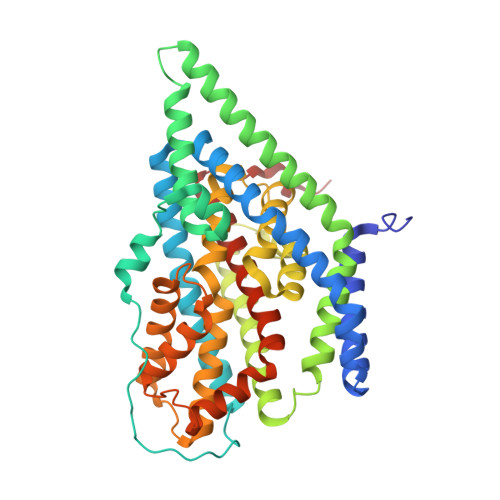Structural Aspects of Photopharmacology: Insight into the Binding of Photoswitchable and Photocaged Inhibitors to the Glutamate Transporter Homologue.
Arkhipova, V., Fu, H., Hoorens, M.W.H., Trinco, G., Lameijer, L.N., Marin, E., Feringa, B.L., Poelarends, G.J., Szymanski, W., Slotboom, D.J., Guskov, A.(2021) J Am Chem Soc 143: 1513-1520
- PubMed: 33449695
- DOI: https://doi.org/10.1021/jacs.0c11336
- Primary Citation of Related Structures:
6ZGB, 6ZL4, 6ZLH - PubMed Abstract:
Photopharmacology addresses the challenge of drug selectivity and side effects through creation of photoresponsive molecules activated with light with high spatiotemporal precision. This is achieved through incorporation of molecular photoswitches and photocages into the pharmacophore. However, the structural basis for the light-induced modulation of inhibitory potency in general is still missing, which poses a major design challenge for this emerging field of research. Here we solved crystal structures of the glutamate transporter homologue Glt Tk in complex with photoresponsive transport inhibitors-azobenzene derivative of TBOA (both in trans and cis configuration) and with the photocaged compound ONB-hydroxyaspartate. The essential role of glutamate transporters in the functioning of the central nervous system renders them potential therapeutic targets in the treatment of neurodegenerative diseases. The obtained structures provide a clear structural insight into the origins of photocontrol in photopharmacology and lay the foundation for application of photocontrolled ligands to study the transporter dynamics by using time-resolved X-ray crystallography.
Organizational Affiliation:
University Medical Center Groningen, Department of Radiology, Medical Imaging Center, University of Groningen, Hanzeplein 1, 9713 GZ Groningen, The Netherlands.

















